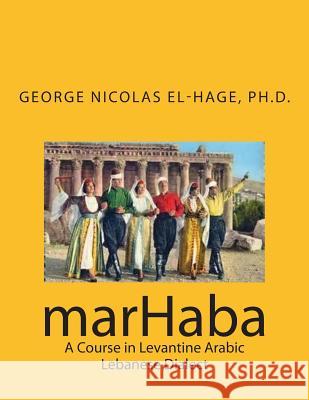marHaba: A Course in Levantine Arabic - Lebanese Dialect » książka
marHaba: A Course in Levantine Arabic - Lebanese Dialect
ISBN-13: 9781508595311 / Angielski / Miękka / 2015 / 246 str.
This book is a basic, direct and self-guided handbook to learn Levantine dialect. It is a simple, easy to use textbook for both the motivated student and teacher alike. It is useful for beginners with no knowledge of Arabic and for those who have had about a semester or two of either dialect or MSA. It is particularly helpful for people who are going to travel to the Levant for the first time or those who have lived there for a while and need to master and reinforce what they have learned. The book is designed for foreign students who have little or no knowledge of Arabic, formal or informal. It can be used by students themselves on their own, or with the help of an instructor or a tutor. Basically every word is introduced in three forms: Arabic form, transliteration form and English meaning. A beginner non-native who only desires to speak and communicate orally can rely on transliteration and English, while a more experienced student, a heritage student or a non-native with a year of exposure to Arabic who can read and has learned some basic survival vocabulary, may also benefit from the Arabic script and the grammatical notes available in the book. Even if you are well versed in MSA, you still need to have this book. You may already be able to read the newspaper headlines or listen to the news and read a street sign, but it will sound very awkward to use MSA when you meet and greet someone, need a taxi, ask for directions, bargain and negotiate, open a bank account, order a meal or a sandwich, chat with someone in the street or in a cafe, enter a supermarket or a store, ask for the time, or make an appointment and get to know someone on a personal or even professional level, etc. The book is divided into 72 sections, and 24 lessons, mainly by topic. Each section contains pertinent vocabulary needed and used when dealing with the situation at hand. So if you are looking for a word about clothing, or medicine, for example, you simply look in that particular section. There are also sufficient exercises in translation with answers provided for you to doublecheck and verify your knowledge. Do the exercise first before you look up the answer. Continuously test yourself, memorize new words, read and speak out loud even when you are alone and pick the brain of a native friend or acquaintance. Lebanese, and Arabs in general, are impressed when you attempt to speak Arabic with them. They will go out of their way to help you and make your acquaintance. However, they will also try first to practice their English or French with you. Most of them are bilingual or even trilingual. Do not fall for this. Insist on using your Arabic first. The best way to learn a foreign language is through total immersion. Go ahead, immerse yourself. You will be forced to float. Drowning is not an option. You are too smart to drown. Study this book, and find a group of natives to chat with. Better yet, visit Lebanon and have some maza, tabbouli and araq. Then, we'll talk. Do not be afraid to make mistakes. Keep on trying. Practice makes perfect."
Zawartość książki może nie spełniać oczekiwań – reklamacje nie obejmują treści, która mogła nie być redakcyjnie ani merytorycznie opracowana.











